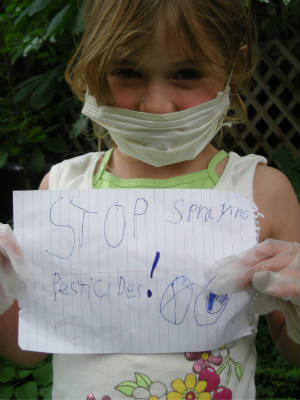
A group of parents and kids in Vernon are celebrating, after School District 22 finally agreed to stop using pesticides to control dandelions and other “cosmetic pests” on school properties. After years of inaction by the School District, parents used the School Act, with help from lawyers funded through West Coast’s Environmental Dispute Resolution Fund, in a new and innovative way to get the school district to take a serious look at the issue.
Commercial pesticides in a school yard
Until 2009 the School District controlled pests on its property under a Pest Management Plan that allowed it to spray – amongst other pesticides – Par III® Turf Herbicide Solution, which contains the chemicals Mecoprop-P, 2,4-Dand Dicamba. To quote the toxicological information from Par III’s label:
This product may cause severe irritation to the eyes, and irritation to the skin and mucous membranes. Symptoms of overexposure to this product may include coughing, burning, dizziness or temporary loss of muscle coordination, muscle weakness, loss of appetite, weight loss, vomiting, decreased heart rate, shortness of breath, excitement, tenseness, depression, incontinence, cyanosis, muscle spasms, exhaustion and loss of voice. Other possible effects of overexposure include fatigue, muscle weakness or nausea. Treat symptomatically.
It’s actually quite similar in composition to Wilson® Lawn Weedout® Concentrate, which we’ve written about in a recent post, except that Par III is designed for commercial, and not residential, use, and therefore is significantly stronger.
Understandably, parents were concerned. Kerry Bokenfohr, a parent of two school age kids, writes:
We started out 10 years ago as a group of Moms who would meet at different playgrounds and we began to notice that there were signs everywhere notifying us that pesticides had been applied. We began to ask questions, organized a group, attended school board and city meetings, and essentially were ignored.
An appealing solution
The Moms – calling themselves Parents for Healthy Play Spaces – approached West Coast Environmental Law in 2009, and used a grant from the Environmental Dispute Resolution Fundto hire Richard Overstall of Buri Overstall to help them develop a legal strategy.
Richard Overstall, after finding that there were few options under the province’s Integrated Pest Management Act, advised the Parents for Healthy Play Spaces to turn to section 11 of the School Act. The section reads, in part:
If a decision of an employee of a board significantly affects the education, health or safety of a student, the parent of the student or the student may, within a reasonable time from the date that the parent or student was informed of the decision, appeal that decision to the board. [Emphasis added]
So, acting on behalf of the Parents, Richard Overstall filed an appeal of the District’s Maintenance Supervisor’s use of Par III in July 2009.
From a 1-year moratorium to a ban on cosmetic pesticides
After some initial confusion about what was involved in an appeal, in November 2009 the Parents received a letter from the District confirming receipt of the appeal, but also offering a 1 year moratorium on pesticide use on school grounds while a Sub-Committee appointed by the School District re-examined the District’s pesticide use policy. The Parents agreed to suspend its appeal while the Sub-Committee did its work, and Kerry Bokenfohr was appointed as a parents’ representative on the Sub-Committee.
The Sub-Committee ultimately recommended amending the School District policies to eliminate cosmetic pesticide use. On June 21, 2011 the School District Board amended its policy, deciding, in part that:
Pesticides will not be applied for cosmetic purposes. … In so doing, wherever practical and feasible, the Board requires that alternative methods of pest, insect, and noxious weed control be used rather than through the use of chemicals. Where it is deemed that a chemical control is necessary then the least noxious and environmentally detrimental chemical or organic agent will be used. Where use of chemical control is required as for crack and crevice the district is to adopt a phase out of chemical use.
This new policy was finally publicly released only last week, when the new policy was posted to the District’s website. In addition to banning cosmetic pesticide use on school properties, the policy represents a dramatic scaling back of the use of pesticides at schools for other purposes.
Kerry Bokenfohr writes:
We are thrilled that a policy of “no pesticides for cosmetic purposes” has been adopted for all Vernon schoolyards. Our lawyer was instrumental in guiding us and with writing letters to school administration. Thank you, West Coast Environmental Law!
And thanks and congratulations to Kerry and the Parents for Healthy Playspaces who have fought this fight for about 10 years, and to Richard Overstall for coming up with the creative use of the School Act.

Photos courtesy of Kerry Bokenfohr